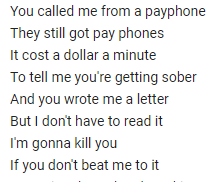
1/People sometimes ask me how I form my ideas about the world! Well, folks, there are basically two ingredients: Song lyrics, and data.
Just read a bunch of papers and articles and stuff, and try to relate it to song lyrics.
Just read a bunch of papers and articles and stuff, and try to relate it to song lyrics.
2/Let's go through an example: How the song "Kyoto", by Phoebe Bridgers, illustrates some of the problems with the American development model (infrastructure, education, and health).
3/We start the song in Japan, where the narrator (presumably, Phoebe herself) is utterly uninterested in the country or its culture, but finds bullet trains, pay phones (!!), and chain convenience stores pretty convenient. 

4/The object of the song -- presumably, a guy Phoebe is romantically involved with -- is suffering from substance abuse, which is causing the narrator no end of frustration. 

5/Already we can see an anecdote reflecting the work of economists Anne Case and Angus Deaton, who (among others) have noted rising opiate abuse and "deaths of despair" in the U.S., especially (though not exclusively) among blue-collar white people:
press.princeton.edu/books/hardcove…
press.princeton.edu/books/hardcove…
6/Anyway, let's go on with the song. The narrator is feeling ennui in her American city. She's lonely, driving around the suburbs, with only her brother to hang out with. 

7/The people in the song are clearly identified as blue-collar (probably white) Americans, with such identifiers as trucks, suburbs, conspiracy theories, and astrology. 

8/A cultural milieu is depicted: People isolated by suburban sprawl, auto transport, distrust of institutions, poor health, and superstitious thinking.
A working class left behind by the institutions that should be serving it.
A working class left behind by the institutions that should be serving it.
9/The stereotype of blue-collar Americans as superstitious, poorly educated, and anti-scientific is actually pretty wrong:
fivethirtyeight.com/features/ameri…
fivethirtyeight.com/features/ameri…
11/There's plenty of data on loneliness and deteriorating social relationships, especially among American youth:
bloomberg.com/opinion/articl…
bloomberg.com/opinion/articl…
12/And of course, surveys document that Americans' trust in most of our institutions has declined precipitously in recent years.
(That's probably what leads to conspiracy thinking like "chemtrails".)
pewresearch.org/fact-tank/2019…
(That's probably what leads to conspiracy thinking like "chemtrails".)
pewresearch.org/fact-tank/2019…
13/Now, lots of Americans are trying to think of ways to reverse the situation. One idea is that building better transit and denser cities -- as Japan does -- would reduce isolation.
theguardian.com/cities/2018/ju…
theguardian.com/cities/2018/ju…
14/Would better infrastructure and denser development help cure America's social ills? It wouldn't be enough on its own, but it might help.
louise-arseneault.com/CMSUploads/201…
www3.nd.edu/~adutt/activit…
louise-arseneault.com/CMSUploads/201…
www3.nd.edu/~adutt/activit…
16/Anyway, lots of song lyrics and other pieces of art are (accidental or intentional) reflections of bigger ideas, some of which are supported by the data and some of which are not.
17/But regardless of whether better trains would heal blue-collar American social dysfunction, "Kyoto" is a great song, and worth a listen!
(end)
(end)
• • •
Missing some Tweet in this thread? You can try to
force a refresh





